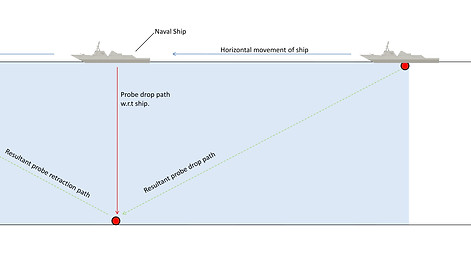Finding hidden submarine trails
XCTD or eXpendable Conductivity and Thermal Detection Probe is an instrument to analyze the temperature and salinity of a section of the ocean. It's a long tube with an optical fiber tether that is shot into the water mostly by a handheld gun from a sailing ship. It is majorly used by the navy to detect submarine trails.
The aim was to make this more effective.
Impact
• Reusable Probe saving lakhs for the Indian Navy
• Suggested Hull mounted version of the same
• No Major instrument update, only structure.
Time Frame
2 mos

Understanding XCTD
Majorly the basic design of an XCTD is like a missile. When dropped it points towards the seabed. There are instruments within the probe which relays back information at a regular interval. As the name says, It's designed for one time use.

Understanding the problem statement, We ventured into the idea of making this re-usable.
With help of material sciences, and veterans in this field, we came up with a double sided probe which can collected information while its dropped and when its retracted.
The pain point was that the tether was made of optical fibre and its not strengthened to pull-up the probe.
Hence we formulated to have a secondary cable coating of a nylon composite to provide additional strength.

Major limitations of the existing design was that it was Expendable and it only profiled the square are from its drop point to the sea bed.
Understanding these limitations, we added proximity sensors to stop the drop and start retracting.
In the image below, you can see that the redesigned probe can analyse twice the area as the first one.


Fitting the launcher under a ship
The idea was to have a hull-mounted CTD probe so that all launches can be directly mapped with the shipmovement and we can launch it automatically in a regular interval.



Idea was accepted into the Indian Navy!
I worked with an agency working for NPOL in Kochi, Kerala while I had suggested and presented all the changes. The project remained under development for 2 years and finally on April 2018, it was made public.






